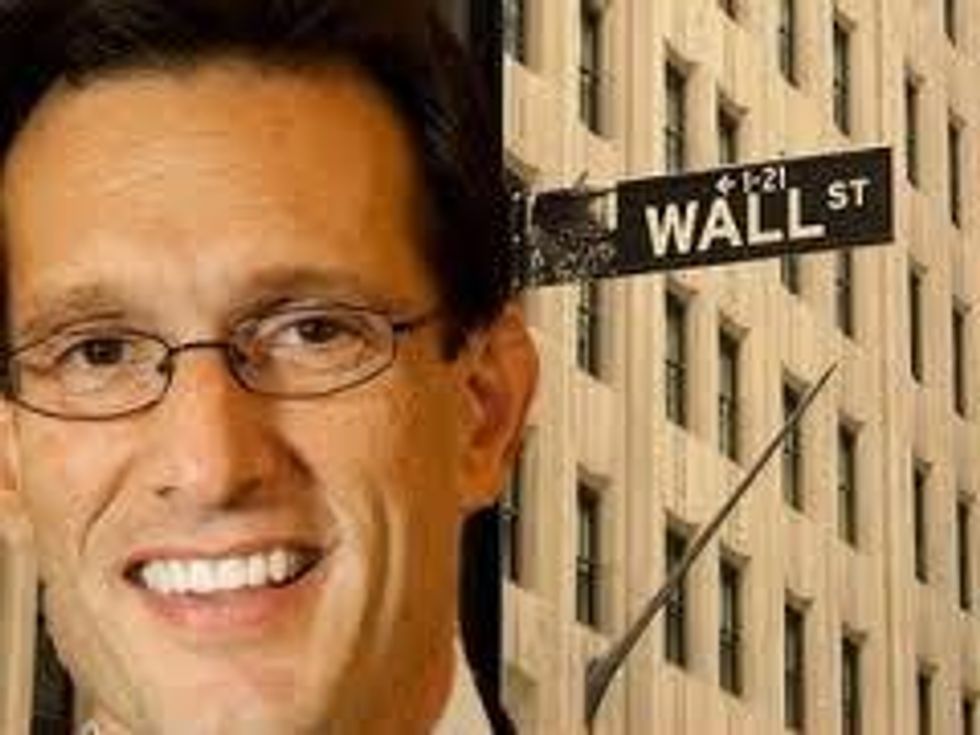Eric Cantor's Wall Street Insider Trading Loophole
Sometimes, public outrage bubbles up, and forces Congress to take action to advance the public interest. The Big Business interests who normally count on the legislative process operating according to plan lose control. And that's when they really set to work.
And it's when the public interest advocates and the public itself are tested: With momentum on our side, do we have the attention span and organizational might to defeat aroused corporate interests?
Sometimes, public outrage bubbles up, and forces Congress to take action to advance the public interest. The Big Business interests who normally count on the legislative process operating according to plan lose control. And that's when they really set to work.
And it's when the public interest advocates and the public itself are tested: With momentum on our side, do we have the attention span and organizational might to defeat aroused corporate interests?

There is this curious fact: Members of Congress do demonstrably better on the stock market than average investors. There's no plausible reason why this should be so other than that Members use their inside knowledge about legislation under consideration to place informed bets on the stock market.
Reformers, including Public Citizen, have long called for remedial action, to no avail. But the issue suddenly clicked with the public after "60 Minutes" ran a piece last November.
As public anger mounted, it became impossible for Congress not to act.
Last week, the Senate passed the STOCK Act to prevent Congressional insider trading. As the bill was being considered, amendments made it stronger. Notably, the Senate reinserted a provision on lobbyists, hedge fund managers and Wall Street traders obtaining and using inside government information. The provision is very modest, requiring only that so-called "political intelligence" consultants register.
"Political intelligence professionals aren't considered lobbyists, so they don't have to disclose that they're seeking information and are paid for it" when they meet with elected officials or staffers, says Senator Charles Grassley, R-IA, who introduced the amendment. "As a result, members of Congress and congressional staff have no way of knowing whether such meetings result in information being sold to firms that trade based on that information. My amendment would shed sunshine on this kind of political intelligence gathering."
Wall Street hates this measure. There's a mini "political intelligence" industry that obtains information from political insiders and uses or sells it on Wall Street. You can see how knowing that a committee chair plans to add an obscure provision to a piece of legislation could translate into major, short-term advantage on the stock markets. Hedge funds love this kind of stuff.
Integrity Research Associates estimates the value of the global market for policy research and political intelligence services at roughly $402 million in 2009. They identify major lobby firms as among the leading political intelligence operations, including Patton Boggs, Akin Gump Strauss Hauer & Feld and Cassidy & Associates.
Wanting to preserve their unfair advantage from inside Congressional information, Wall Street lobbyists had Republican Majority Leader Eric Cantor strip the provision from the House bill.
It was quite a brazen move by Cantor. He knows Wall Street is unpopular. He knows the Democrats are going to attack him over the move. He has to know that he is defending the ability of a small slice of Wall Street traders gaining unfair advantage in the markets.
Now the ball is back in our court. The House and Senate versions will go to conference committee so that differences can be worked out (or alternatively, Congressional leadership might just negotiate a deal). It's up to all of us to build a groundswell that forces Congress to put the provision back in the legislation. Sign the petition to eliminate Eric Cantor's Wall Street insider trading loophole.
An Urgent Message From Our Co-Founder
Dear Common Dreams reader, The U.S. is on a fast track to authoritarianism like nothing I've ever seen. Meanwhile, corporate news outlets are utterly capitulating to Trump, twisting their coverage to avoid drawing his ire while lining up to stuff cash in his pockets. That's why I believe that Common Dreams is doing the best and most consequential reporting that we've ever done. Our small but mighty team is a progressive reporting powerhouse, covering the news every day that the corporate media never will. Our mission has always been simple: To inform. To inspire. And to ignite change for the common good. Now here's the key piece that I want all our readers to understand: None of this would be possible without your financial support. That's not just some fundraising cliche. It's the absolute and literal truth. We don't accept corporate advertising and never will. We don't have a paywall because we don't think people should be blocked from critical news based on their ability to pay. Everything we do is funded by the donations of readers like you. Will you donate now to help power the nonprofit, independent reporting of Common Dreams? Thank you for being a vital member of our community. Together, we can keep independent journalism alive when it’s needed most. - Craig Brown, Co-founder |
Sometimes, public outrage bubbles up, and forces Congress to take action to advance the public interest. The Big Business interests who normally count on the legislative process operating according to plan lose control. And that's when they really set to work.
And it's when the public interest advocates and the public itself are tested: With momentum on our side, do we have the attention span and organizational might to defeat aroused corporate interests?

There is this curious fact: Members of Congress do demonstrably better on the stock market than average investors. There's no plausible reason why this should be so other than that Members use their inside knowledge about legislation under consideration to place informed bets on the stock market.
Reformers, including Public Citizen, have long called for remedial action, to no avail. But the issue suddenly clicked with the public after "60 Minutes" ran a piece last November.
As public anger mounted, it became impossible for Congress not to act.
Last week, the Senate passed the STOCK Act to prevent Congressional insider trading. As the bill was being considered, amendments made it stronger. Notably, the Senate reinserted a provision on lobbyists, hedge fund managers and Wall Street traders obtaining and using inside government information. The provision is very modest, requiring only that so-called "political intelligence" consultants register.
"Political intelligence professionals aren't considered lobbyists, so they don't have to disclose that they're seeking information and are paid for it" when they meet with elected officials or staffers, says Senator Charles Grassley, R-IA, who introduced the amendment. "As a result, members of Congress and congressional staff have no way of knowing whether such meetings result in information being sold to firms that trade based on that information. My amendment would shed sunshine on this kind of political intelligence gathering."
Wall Street hates this measure. There's a mini "political intelligence" industry that obtains information from political insiders and uses or sells it on Wall Street. You can see how knowing that a committee chair plans to add an obscure provision to a piece of legislation could translate into major, short-term advantage on the stock markets. Hedge funds love this kind of stuff.
Integrity Research Associates estimates the value of the global market for policy research and political intelligence services at roughly $402 million in 2009. They identify major lobby firms as among the leading political intelligence operations, including Patton Boggs, Akin Gump Strauss Hauer & Feld and Cassidy & Associates.
Wanting to preserve their unfair advantage from inside Congressional information, Wall Street lobbyists had Republican Majority Leader Eric Cantor strip the provision from the House bill.
It was quite a brazen move by Cantor. He knows Wall Street is unpopular. He knows the Democrats are going to attack him over the move. He has to know that he is defending the ability of a small slice of Wall Street traders gaining unfair advantage in the markets.
Now the ball is back in our court. The House and Senate versions will go to conference committee so that differences can be worked out (or alternatively, Congressional leadership might just negotiate a deal). It's up to all of us to build a groundswell that forces Congress to put the provision back in the legislation. Sign the petition to eliminate Eric Cantor's Wall Street insider trading loophole.
Sometimes, public outrage bubbles up, and forces Congress to take action to advance the public interest. The Big Business interests who normally count on the legislative process operating according to plan lose control. And that's when they really set to work.
And it's when the public interest advocates and the public itself are tested: With momentum on our side, do we have the attention span and organizational might to defeat aroused corporate interests?

There is this curious fact: Members of Congress do demonstrably better on the stock market than average investors. There's no plausible reason why this should be so other than that Members use their inside knowledge about legislation under consideration to place informed bets on the stock market.
Reformers, including Public Citizen, have long called for remedial action, to no avail. But the issue suddenly clicked with the public after "60 Minutes" ran a piece last November.
As public anger mounted, it became impossible for Congress not to act.
Last week, the Senate passed the STOCK Act to prevent Congressional insider trading. As the bill was being considered, amendments made it stronger. Notably, the Senate reinserted a provision on lobbyists, hedge fund managers and Wall Street traders obtaining and using inside government information. The provision is very modest, requiring only that so-called "political intelligence" consultants register.
"Political intelligence professionals aren't considered lobbyists, so they don't have to disclose that they're seeking information and are paid for it" when they meet with elected officials or staffers, says Senator Charles Grassley, R-IA, who introduced the amendment. "As a result, members of Congress and congressional staff have no way of knowing whether such meetings result in information being sold to firms that trade based on that information. My amendment would shed sunshine on this kind of political intelligence gathering."
Wall Street hates this measure. There's a mini "political intelligence" industry that obtains information from political insiders and uses or sells it on Wall Street. You can see how knowing that a committee chair plans to add an obscure provision to a piece of legislation could translate into major, short-term advantage on the stock markets. Hedge funds love this kind of stuff.
Integrity Research Associates estimates the value of the global market for policy research and political intelligence services at roughly $402 million in 2009. They identify major lobby firms as among the leading political intelligence operations, including Patton Boggs, Akin Gump Strauss Hauer & Feld and Cassidy & Associates.
Wanting to preserve their unfair advantage from inside Congressional information, Wall Street lobbyists had Republican Majority Leader Eric Cantor strip the provision from the House bill.
It was quite a brazen move by Cantor. He knows Wall Street is unpopular. He knows the Democrats are going to attack him over the move. He has to know that he is defending the ability of a small slice of Wall Street traders gaining unfair advantage in the markets.
Now the ball is back in our court. The House and Senate versions will go to conference committee so that differences can be worked out (or alternatively, Congressional leadership might just negotiate a deal). It's up to all of us to build a groundswell that forces Congress to put the provision back in the legislation. Sign the petition to eliminate Eric Cantor's Wall Street insider trading loophole.

